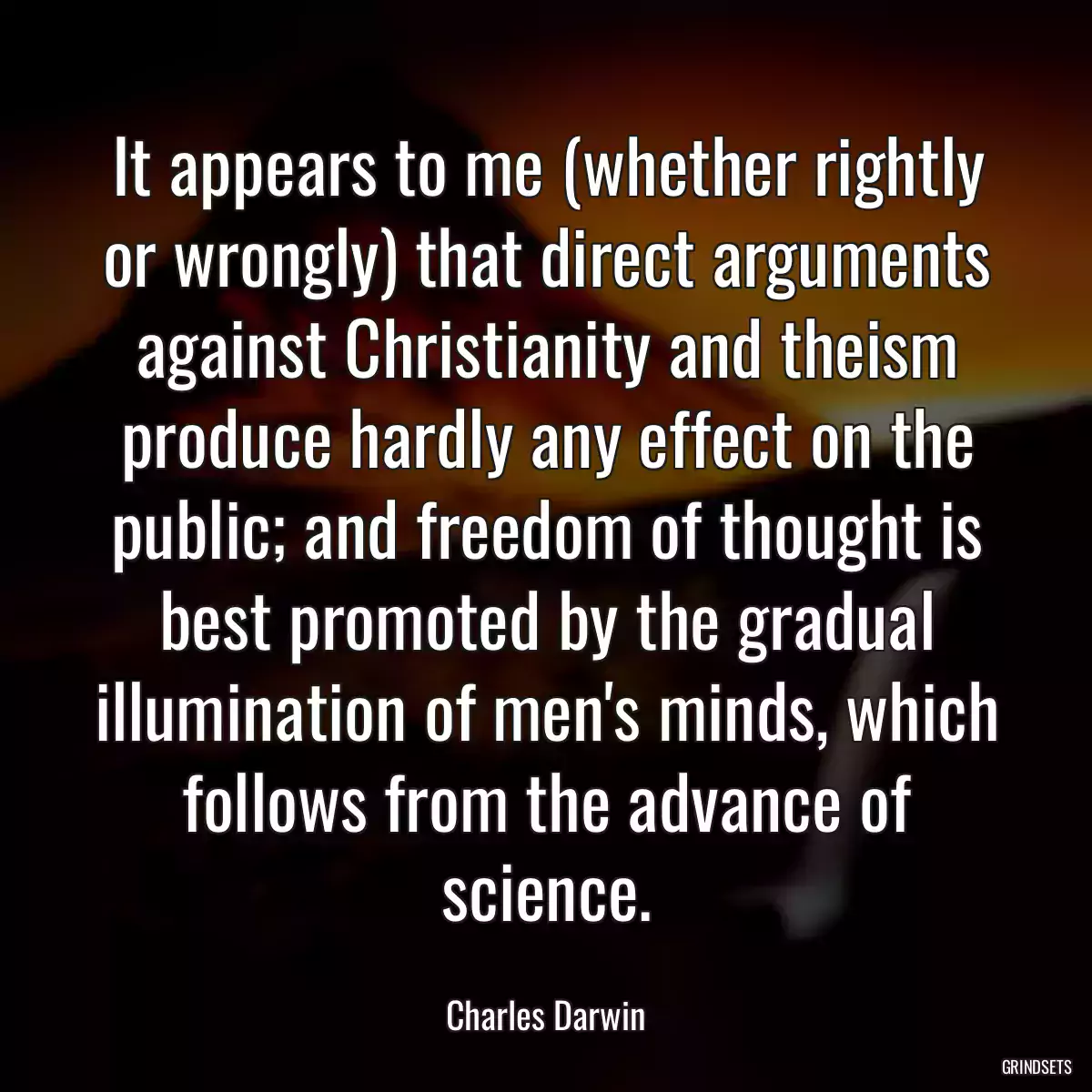
Quotes Charles Darwin - page 4
Find dozens of Charles Darwin with images to copy and share.

He who is not content to look, like a savage, at the phenomena of nature as disconnected, cannot any longer believe that man is the work of a separate act of creation ... Man is the co-descendant with other mammals of a common progenitor.
The western nations of Europe, who now so immeasurably surpass their former savage progenitors, and stand at the summit of civilization, owe little or none of their superiority to direct inheritance from the old Greeks, though they owe much to the written works of that wonderful people.
May we not suspect that the vague but very real fears of children, which are quite independent of experience, are the inherited effects of real dangers and abject superstitions during ancient savage times?
You may also like
With savages, the weak in body or mind are soon eliminated. We civilized men, on the other hand, do our utmost to check the process of elimination. We build asylums for the imbecile, the maimed and the sick. Thus the weak members of civilized societies propagate their kind. No one who has attended to the breeding of domestic animals will doubt that this must be highly injurious to the race of man. Hardly anyone is so ignorant as to allow his worst animals to breed.
At some future period, not very distant as measured by centuries, the civilised races of man will almost certainly exterminate and replace throughout the world the savage races. At the same time the anthropomorphous apes, as Professor Schaaffhausen has remarked, will no doubt be exterminated. The break will then be rendered wider, for it will intervene between man in a more civilised state as we may hope, than the Caucasian and some ape as low as a baboon, instead of as at present between the negro or Australian and the gorilla.
A grand and almost untrodden field of inquiry will be opened, on the causes and laws of variation, on correlation of growth, on the effects of use and disuse, on the direct actions of external conditions, and so forth.
The theory which I would offer, is simply, that as the land with the attached reefs subsides very gradually from the action of subterranean causes, the coral-building polypi soon raise again their solid masses to the level of the water: but not so with the land; each inch lost is irreclaimably gone; as the whole gradually sinks, the water gains foot by foot on the shore, till the last and highest peak is finally submerged.
...conscience looks backwards and judges past actions, inducing that kind of dissatisfaction, which if weak we call regret, and if severe remorse.

Much love much trial, but what an utter desert is life without love.
A moral being is one who is capable of reflecting on his past actions and their motives - of approving of some and disapproving of others.
A man's friendships are one of the best measures of his worth.
A celebrated author and divine has written to me that he has gradually learned to see that it is just as noble a conception of the Deity to believe that he created a few original forms capable of self-development into other and needful forms, as to believe that he required a fresh act of creation to supply the voids caused by the action of his laws.
Man himself cannot express love and humility by external signs, so plainly as does a dog, when with drooping ears, hanging lips, flexuous body, and wagging tail, he meets his beloved master.
It is scarcely possible to doubt that the love of man has become instinctive in the dog.
I always feel as if my books came half out of Lyell's brain... & therefore that when seeing a thing never seen by Lyell, one yet saw it partially through his eyes.
I am almost convinced (quite contrary to opinion I started with) that species are not (it is like confessing a murder) immutable.
You may also like

At last gleams of light have come, and I am almost convinced (quite contrary to opinion I started with) that species are not (it is like confessing a murder) immutable. Heaven forfend me from Lamarck nonsense of a 'tendency to progression', 'adaptations from the slow willing of animals', &c! But the conclusions I am led to are not widely different from his; though the means of change are wholly so. I think I have found out (here's presumption!) the simple way by which species become exquisitely adapted to various ends.